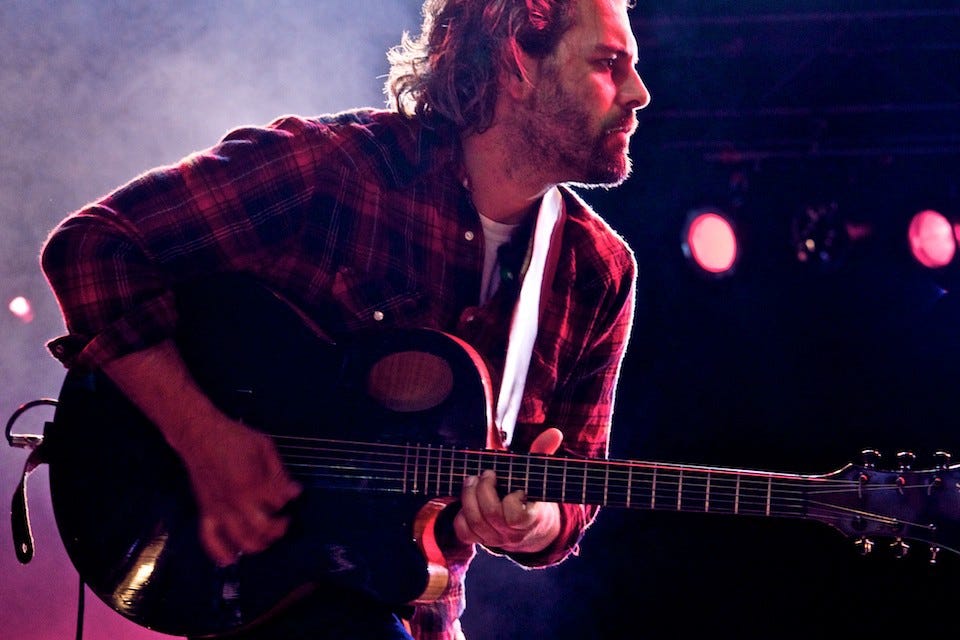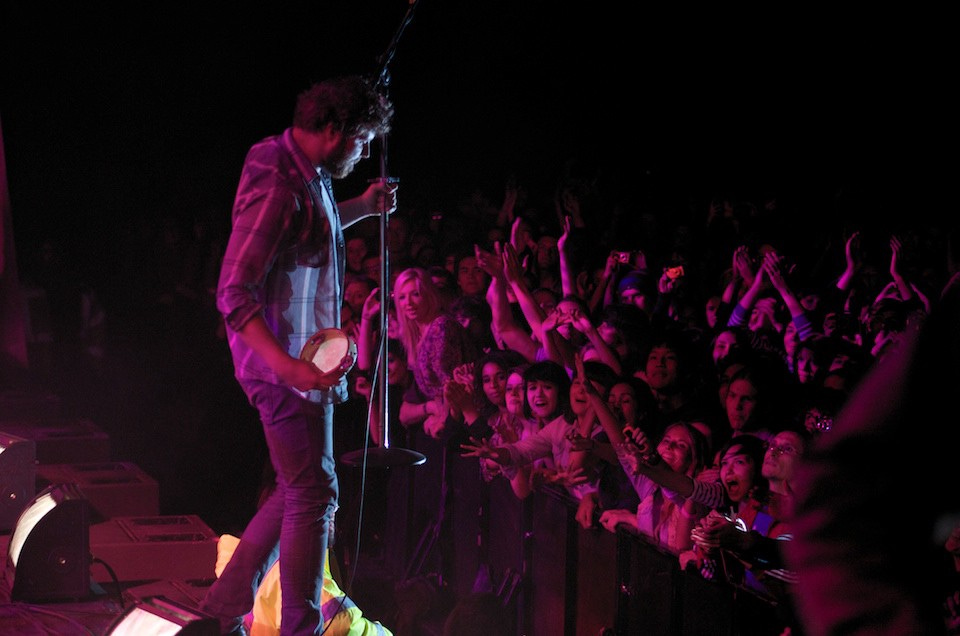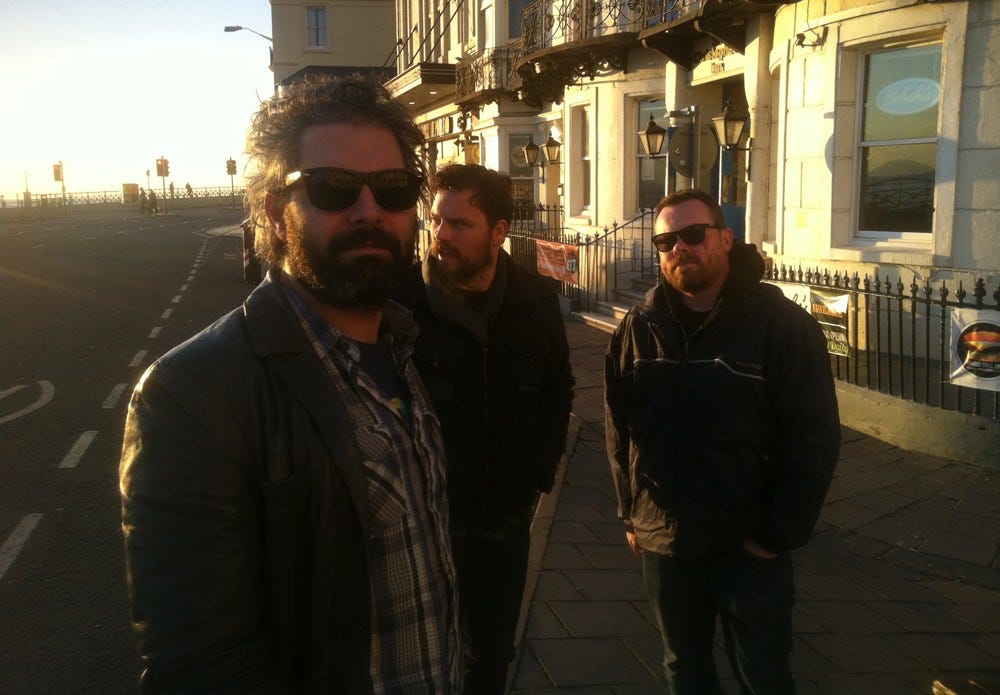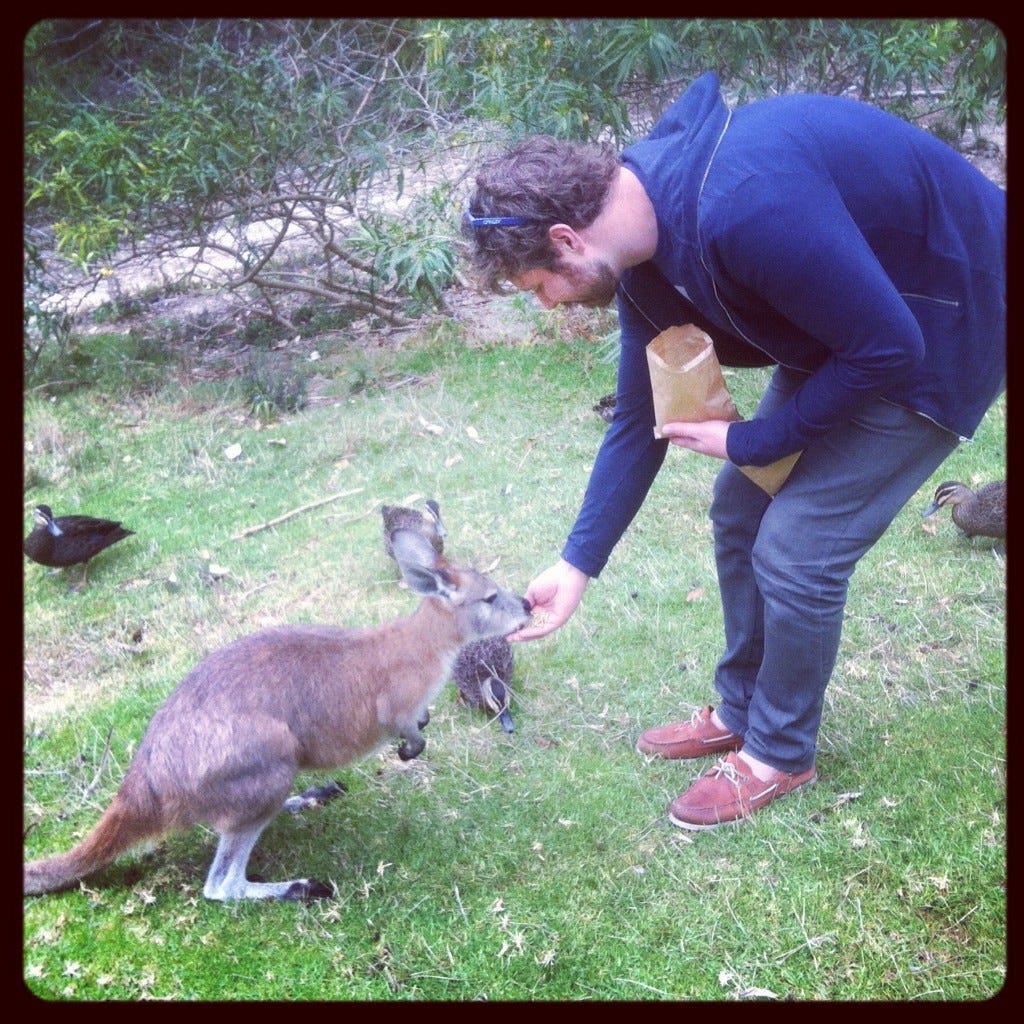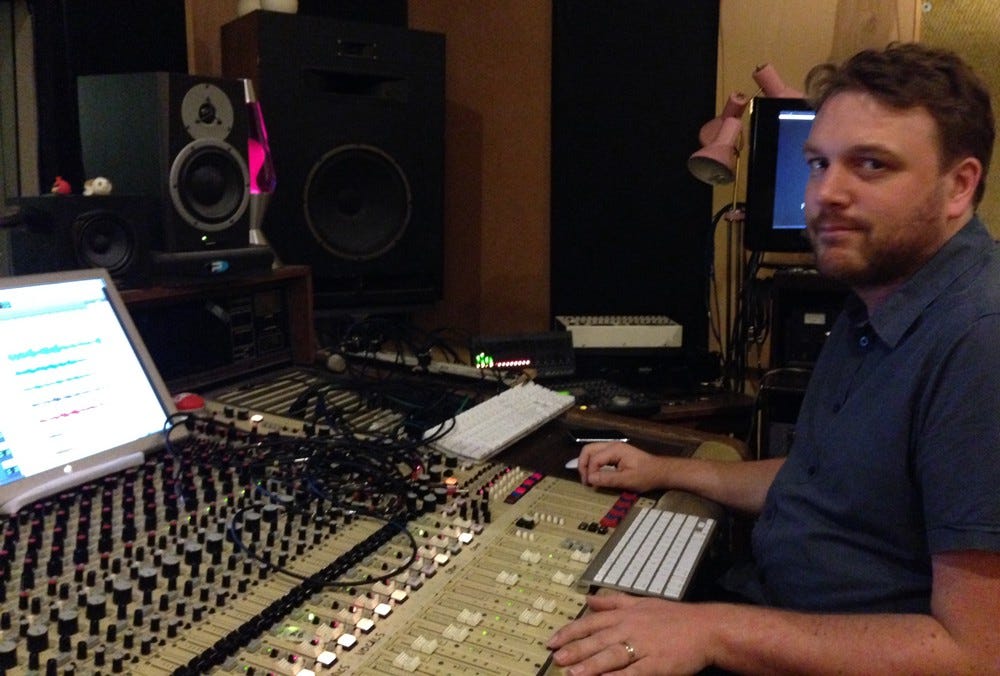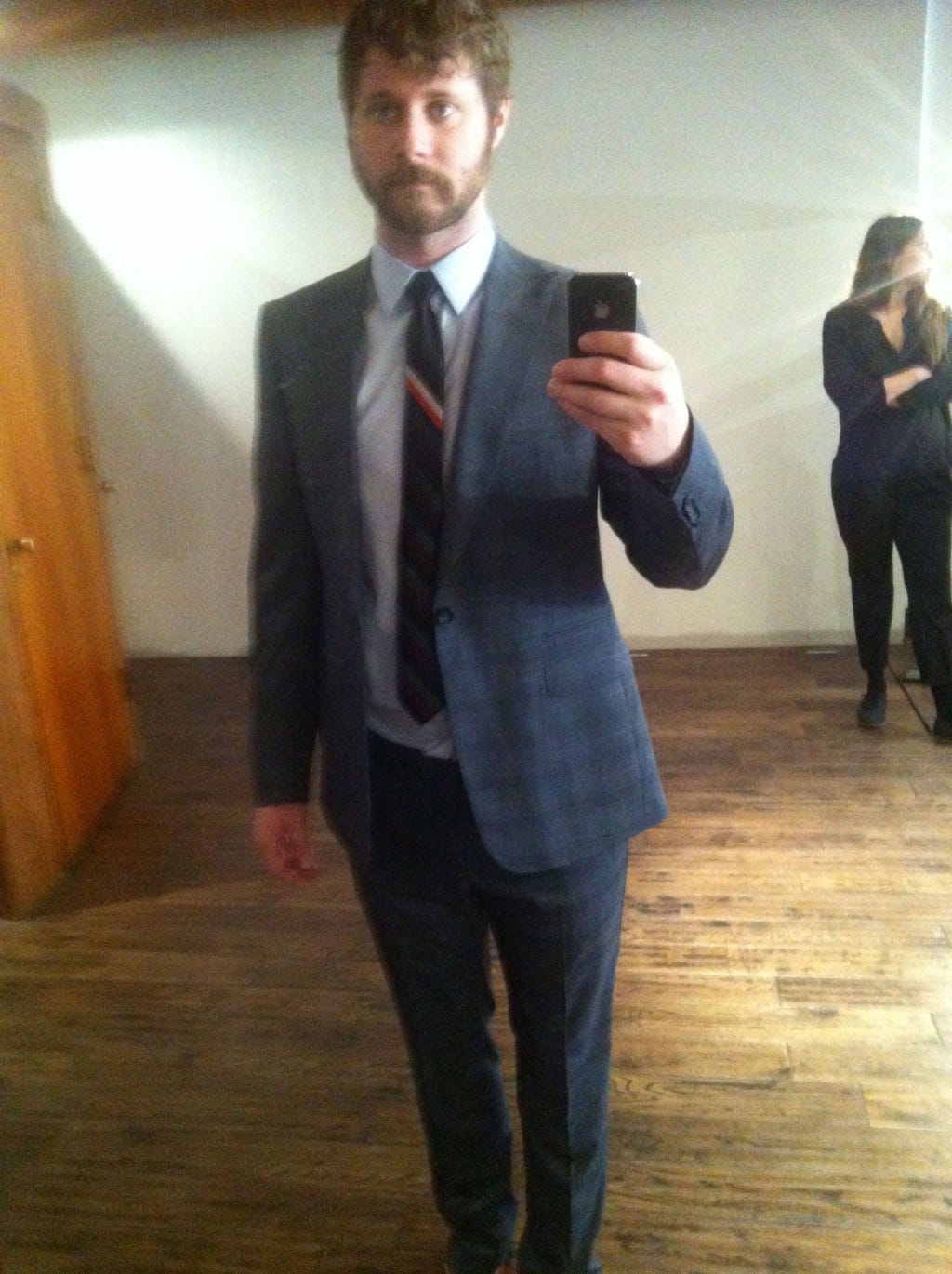Four years of thought and trial-by-fire manifested in the creation of Nice, Nice, Very Nice (2009). I’d spent that time cutting my teeth in the corners of noisy bars to people who were there for the drinks and, almost specifically, not for the music. My presence was not anticipated, but, more accurately — tolerated. Sometimes I’d had other musicians with me, but most often, I was alone. I felt like a comedian, chiseling my material in the underground. Figuring out what kept people, and what didn’t. I had to earn every perked ear. I played cafes, living rooms, back yards, sports bars — literally anywhere that would have me.
Oh Fortune was born of a different kind of storm. Luckily, Nice, Nice, Very Nice had succeeded. Those bars became theatres, and the momentum of a burgeoning career demanded a more consistent cast of faces in the van.
I knew that I had learned how to hold an audience. I knew that I had begun to unfold my mind through lyrics and melody. But I also knew that I didn’t know a whole lot about music. So I hired people who did. I needed an education, and surrounded myself with people who’d actually had one.
Kenton Loewen was an absolute Phoenix who brought fire everywhere he went. Every night he torched himself on stage and every morning, he was resurrected. I’d seen him at The Media Club (Rest In Peace) in Vancouver with Patrick Brealy and also Mother (who eventually became Mother Mother). I barely knew him when I asked if he’d come to Toronto to record Nice, Nice. As things got busy and that album picked up steam, I sensed that if I wanted to keep him interested, he needed some familiar camaraderie around from the free-jazz scene, and I eagerly took up his suggestion to invite Gordon Grdina for our trip to Austin in 2010 for SXSW.
Gord’s stage presence was once described by an Australian journalist as “a bear wrestling a honeypot”. This was accurate. Gord’s intensity matched Kenton’s, but was entirely his own. I was in awe of how these two interacted musically. Their musicality was from another world. I always knew that I’d never approach their ranks as a musician — how masterful, how intuitive, how gifted and connected they were with their instruments, but I forgave myself.
It’s easy to convince yourself you’re being humble about your stunted abilities when it’s your name on the ticket. After all, I had my own intensity, didn’t I? And it wasn’t with my guitar — it was with the crowd.
John Walsh was my rock. Johnny Wah. He didn’t scoff at my seemingly pedestrian musical choices in the van. He bridged the gap between Gord and Kenton’s world and my own. He properly understood music, but wasn’t quite as romantic, philosophical, or inebriated about it. John was dependable. Never tardy. And his bass playing was just that. I could always count on him. Solid.
Real friendship brewed. Over time, these guys became my brothers. We found common ground, musically and personally. We found music we all loved and could enjoy on tour. And they taught me to play music. Not to lead, but to listen. To wait. To be unsure. To investigate every imperfection for what surprises might be held within. To love the rabbit hole. To scream. To earn muscle memory and then throw it all away. To let go. I owe them the credit of this important education.

Unlike its predecessor, Oh Fortune was written quickly and without much battle-testing. Life was fast. I’d been signed to Arts & Crafts and had to deliver something veritable. I was on the road more than 250 days in 2010. I had no kids, and the benefit of youth. I cannot imagine that kind of touring today.
Leaves, Trees, Forest came to life late into the night on a windy, rocky beach in Brighton, England. I’d been ruminating on the endless cast of gas station workers we’d come across on tour. Everywhere we went… there were just more people. All connected to a larger system. Roads like veins carrying us in a variety of metal boxes to buy roasted almonds from people who spoke different languages — both literally and metaphorically. You can’t remove any one part of the system without changing the entire expansive apparatus of life itself. The leaf is the forest.
Rows of Houses was written on a flight to Australia, after re-watching Stand By Me. The characters, all classic archetypes of childhood wonder and ennui, inhabit a living Norman Rockwell painting — a perfect American town. They find themselves on tracks they don’t control, and cannot divert from. The crazy kid. The bad kid. The arty kid. The klutz. They’re aching for something that feels real, honest, and beyond the group-think existence within the small town construct. They want to taste something. They want respite from the typecast. They want to dance in ephemerality, if only to touch the venerable nerve, feel its magnitude, and then crawl back to what’s familiar. I think we’ve all felt trapped in our own skin at some point.
Jeopardy fell into my hands post soundcheck in the lobby of the Fonda Theatre in Los Angeles. We were opening for The Walkmen. I’d been thinking a lot about opposing pressures. In the world and in my personal relationships. How we want people to see things our way. And how it doesn’t matter how loudly we yell it, how so often it won’t be heard if encased in a knowing statement. How so often, it is questions that disable our defenses and encourage us to ponder our own internal presumptions. A great question can make a beautiful mess of your head. Songwriting can sometimes benefit from the confines of a creative box, and so every lyric of Jeopardy is a question — just like the game show of the same name where the answers are, in fact, questions.
Slowly and steadily, more doors unlocked, thanks to some public recognition and a dash of credibility from Vancouver’s vibrant underground / free-music scene as a worthwhile pop musician. I found myself on tour with dizzyingly talented folks like Jesse Zubot and JP Carter. Tyson Naylor and Peggy Lee.

John Walsh became a dad and took a hiatus from the road, so we were joined for several years by Colin Cowan who, in addition to being an immensely talented bass player, remains the funniest person I have ever known. The most inspiring thing about Colin’s comic spirit was that it was never a dominance play. It was an invitation. Somehow, he made you feel at all times like you were just as funny as he was, even though your better senses knew that was not possible.
I’d heard many of these people ruminate on the mythology of Eyvind Kang, a Seattle musician from another planet who’d played with Lou Reed, Marc Ribot and John Zorn. One day, I asked, “Think he’d be interested in writing orchestral arrangements on the next record?”
One thing I’ve learned is that an open-ended and relaxed phone call with a stranger can sometimes change your life. Eyvind jumped right in. His mark on Oh Fortune is totally unmissable, from the playful orchestral melodies that open About As Helpful to the epilogue of sustained pads at the end of Jeopardy. We went big. Expansive.
We recorded with Colin Stewart at The Hive. Everyone knew this was where the cool records were made. Albums by Black Mountain and Ladyhawk. But the records that sold me on Colin were more intricate and delicate — The Den by P:Ano and Veda Hille’s Return of the Kildeer. Colin turned out to be one of the sweetest and most unassuming teddy bears you could ever hope to make a record with. We clicked immediately. We were both tender dudes. We also made 2015’s Club Meds together.
Nice, Nice had the benefit of a momentum I’d created within myself, but Oh Fortune had the momentum of a train on which there were already passengers. Arts & Crafts licensed it to City Slang in Europe and things quickly started happening in Germany, The Netherlands, Switzerland and the UK.
I spent nearly $1500 on a suit for the JUNO Awards in 2012 — an amount of money that seemed outrageous, frivolous, and exciting to part with. It’s not that I truly had very much money, but there was a feeling of arrival that made the money seem all the more abstract. It felt like I was supposed to arrive at the event looking like I belonged. Both sets of my parents flew out. My moms and my dad and his wife. And, of course, my then-fiancé (and endless source of joy and caretaker of my soul), Kirsten.
My moms had always believed I could have a life in music. From day one, they barely missed a show. I’ve written extensively about how I could never have succeeded without them. But for quite some time, my dad worried that music was just an unfortunate phase for me. That it would lead to instability in my life. I’d spent much of my childhood living four provinces away from my dad; worrying about me had slowly been woven into his DNA.
When I won “Alternative Album of the Year”, my dad leapt to his feet and released a primal exclamation from another dimension. He started crying and couldn’t stop. I remember being down in the press gallery, fielding questions about the win, and my attention kept being drawn to my dad’s face, way back in the distance — lit up as red as a streetlight. After the commotion, we hugged for a long time, and I think he started a lot of sentences without ever finishing them. The only other time I’d seen him cry like that was when I was six years old and he was putting me on an airplane as an Unattended Minor. I remember the smell of the mints and crayons in the loot bag hung around my neck. I was off to a new life in Toronto with my mom. I’ve moved a lot in my life. Flown a lot in my life. I was the new kid in every school. I learned to bob and weave.
Oh Fortune is about changing. Shifting. Adjusting to new footholds in new sands. Finding glory in letting go. Surviving another day and being a touch stronger for it. It’s about dangling your legs for the sharks. It’s about stories to tell as we age. It’s about aching for rain. It’s about the taste of something. It’s about the veins of a leaf mirroring the rivers of its forest. It’s about flags burning together. It’s about the daylight forgiving you. It’s about a bucket of tears on your $1500 suit.
Learn more about the Oh Fortune 10th Anniversary Special Edition 2LP HERE.







